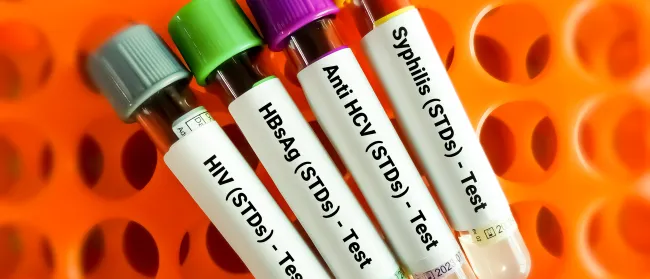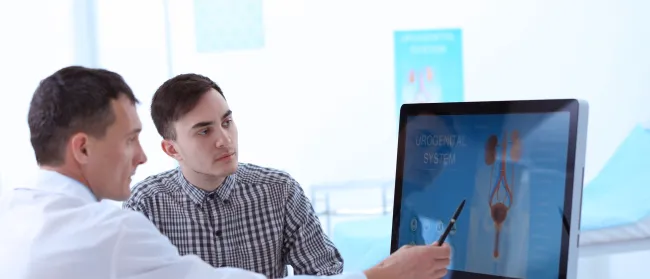Sexually Transmitted Infections / Disease Treatment in Atlanta
Untreated STDs can lead to fertility issues, and certain strains of HPV can increase the risk of cervical and rectal cancers.
What is a Sexually Transmitted Disease (STD)?
STDs can lead to severe health issues, including infertility, chronic pain, and cancer, especially in women. The highly trained specialists at Advanced Urology can provide treatment to cure or manage these conditions effectively.

What Is A Sexually Transmitted Disease (STD)?
Sexually transmitted diseases (STDs) are infections that spread through sexual contact. They are caused by parasites, viruses, or bacteria, with over 20 types of STDs affecting individuals worldwide. Some common types of STDs include:
- HIV/AIDS
- Chlamydia
- Gonorrhea
- Genital herpes
- Human papillomavirus (HPV)
- Trichomoniasis
- Syphilis
- Hepatitis B and C
STDs can lead to severe health issues, including infertility, chronic pain, and cancer, especially in women. The highly trained specialists at Advanced Urology can provide treatment to cure or manage these conditions effectively.

Diagnosing STDs
Our team will review your symptoms, medical history, and perform a physical examination to identify the cause. Diagnostic procedures may include blood tests, urine tests, and tissue biopsies or swabs.

STD Treatment Options
If you have an STD caused by bacteria or parasites, antibiotics can effectively treat and cure the infection.
For STDs caused by viruses, such as herpes and HIV, there is no cure, but medications can help manage symptoms and reduce the risk of transmission. Condoms can further prevent the spread of STDs, though they are not 100% effective.

Symptoms of STDs
UTI vs. STD: What’s the Difference?
While urinary tract infections (UTIs) are not classified as STDs, sexual activity can sometimes trigger UTIs if bacteria such as E. coli enter the urethra during intercourse. Many people with STDs may not experience noticeable symptoms, but some common signs include:
Definitions and Differences of Common STDs
- Chlamydia - A bacterial sexually transmitted infection (STI) caused by Chlamydia trachomatis, often asymptomatic but can cause genital discharge, painful urination, and reproductive complications if untreated. It is easily treated with antibiotics.
- Gonorrhea - A bacterial STI caused by Neisseria gonorrhoeae that can infect the genitals, rectum, and throat. It may cause burning during urination and abnormal discharge but can also be asymptomatic. If untreated, it can lead to serious reproductive complications. Like chlamydia, it is curable with antibiotics but is increasingly showing antibiotic resistance.
- Syphilis - A bacterial infection caused by Treponema pallidum that progresses through four stages (primary, secondary, latent, and tertiary). It starts with painless sores (chancres), followed by a rash and flu-like symptoms, and if untreated, can cause severe organ damage. Unlike gonorrhea and chlamydia, syphilis has distinct stages and long-term effects if left untreated, but it is curable with penicillin in early stages.
- Herpes - A viral infection caused by herpes simplex virus (HSV-1 or HSV-2). HSV-1 primarily causes oral herpes (cold sores), while HSV-2 is more commonly associated with genital herpes. Unlike bacterial STIs, herpes is not curable, but antiviral medications can help manage outbreaks and reduce transmission risk.
- Human Papillomavirus (HPV) - A viral infection with over 100 strains, some causing genital warts and others linked to cervical, throat, and anal cancers. Unlike other STDs, HPV is often cleared naturally by the immune system, but high-risk strains can cause long-term complications. Vaccination is the best prevention method.
- Trichomoniasis - A parasitic STI caused by Trichomonas vaginalis, leading to genital itching, burning, and foul-smelling discharge. It differs from bacterial and viral STIs because it is caused by a protozoan parasite and is curable with a single dose of antibiotics (metronidazole or tinidazole).
- HIV/AIDS - Human Immunodeficiency Virus (HIV) attacks the immune system, weakening the body's ability to fight infections. If untreated, it progresses to Acquired Immunodeficiency Syndrome (AIDS), a life-threatening condition. Unlike most other STDs, HIV is not curable, but antiretroviral therapy (ART) can manage the virus and allow people to live long, healthy lives.
- Hepatitis B - A viral infection that affects the liver, caused by the Hepatitis B virus (HBV). It spreads through blood, sexual contact, or from mother to child at birth. Unlike bacterial STDs, Hepatitis B can become chronic, leading to liver disease or cancer. However, a vaccine is available to prevent infection.
Request Appointment
Frequently Asked Questions (FAQs) About STDs
Q What Are the Most Common STDs?
The most common sexually transmitted diseases (STDs) include chlamydia, gonorrhea, syphilis, herpes, human papillomavirus (HPV), trichomoniasis, HIV/AIDS, and hepatitis B. Some STDs, like chlamydia and gonorrhea, are caused by bacteria and can be treated with antibiotics, while others, like herpes and HIV, are viral infections that require lifelong management. Many STDs can be asymptomatic, making regular testing important for early detection and treatment.
Q What Are the Symptoms of an STD?
STD symptoms vary depending on the infection but may include painful urination, unusual genital discharge, sores or bumps on the genitals, itching or irritation, lower abdominal pain, swollen lymph nodes, and flu-like symptoms. Some STDs, such as chlamydia or HPV, may not show symptoms for a long time, which is why regular screening is essential. If left untreated, STDs can lead to serious complications such as infertility, pelvic inflammatory disease (PID), or an increased risk of transmitting infections to others.
Q How Can I Prevent Getting an STD?
Practicing safe sex is the most effective way to reduce the risk of STDs. Using condoms or dental dams during vaginal, anal, and oral sex significantly lowers the chances of transmission. Regular STD testing, getting vaccinated against HPV and hepatitis B, and having open communication with partners about sexual health are also key preventive measures. Avoiding multiple sexual partners and limiting high-risk behaviors, such as unprotected sex or drug use that involves needle-sharing, can further reduce the risk of infection. For STD testing near me, trust Advanced Urology.
Q How Often Should I Get Tested for STDs?
The frequency of STD testing depends on your sexual activity and risk factors. The CDC recommends that sexually active individuals get tested at least once a year for common STDs like chlamydia, gonorrhea, and HIV. Those with multiple partners, a new partner, or unprotected sex should consider more frequent testing, such as every 3-6 months. Pregnant women and individuals in high-risk groups, such as those with HIV or men who have sex with men (MSM), may need specialized screening. Regular testing helps with early detection and treatment, reducing the risk of complications.
